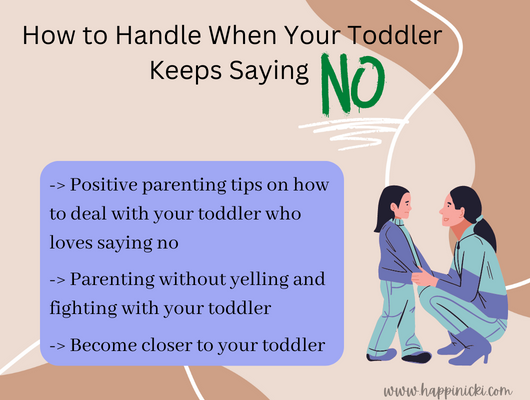You were so happy when your baby was born. And suddenly, your child learned she could decide on her own with the word no. What happened? Did your angel suddenly become a monster? What should you do when your child keeps saying no?
When children are growing up, they will want to stand their ground by resisting everything you ask them. But did you know that when toddlers say no it does not mean they always mean no? Learning more about why toddlers always say no can help both you and your toddler work things out.
Why do toddlers like to say no
Toddlers are learning a lot every day, and that includes saying no. However, when children say no, that does not mean they always mean no. While sometimes they really mean no, oftentimes, toddlers say it to show they want to have control over their lives.
Some parents might ask, “why do toddlers say no when they mean yes?” Blame the children’s brains for wanting to claim autonomy. Much like adults, children want to exercise their will by saying no all the time.
I try (and am still trying) to teach my toddler to “yes,” however, I always receive a cold shoulder. Could it be that it is harder to say the word yes than no? Maybe? But what I am sure of is that your toddler does not mean to anger you when she always says no to your orders.

How to handle toddlers saying no
I think all the parents are asking “how to stop toddlers from saying no?” because it is a healthy part of their development. According to a family psychologist, Dr Kathryn Smerling, your toddler is developing 700 new neural connections every second, showing how rapid your child’s brain growth is.
Adults need to understand that sometimes, toddlers say no when they really mean no. When your toddler says no when you try to hug or kiss them, it helps that we respect their no. It is one way for them to reinforce healthy relationships with the people around them, says Assistant Professor of Counseling Psychology at Teachers College, Columbia University, Cindy Huang.

Let your toddler choose
It is hard to understand why toddlers say no all the time. One way to stop your toddler say no is by giving her choices to help her practice autonomy. If you are eating out, why not let her choose between chicken or fish?
How about asking your toddler what outfit to wear for the party? By allowing your child to choose, you are showing her that her choices matter. It is one way to stop toddler from saying no all the time.
Make it look like a choice
Sometimes, we can make it look like our toddler has choice to make, when in fact, we only want one answer. For example, if your toddler does not want to go home, you can let her choose between walking to the car on their own or you carry her.
While your child can choose which way to ride the car, what you want is for her to ride the car. It looks as if she has a choice, but both choices will only lead to one goal: and that is to ride the car.
Not saying no to toddlers
I get it. You could not help but say no every time your toddler is very experimental. They love touching the electric sockets and inserting fingers into the fan while looking at their parent’s reactions.
So how to avoid saying no to toddlers who are making our hearts skip a beat? One way I found effective for stopping my toddler do something is by not reacting to his actions. It might be hard not to say a word, but when children see their parents not reacting to what they do, they tend to not repeat the actions.
But what to do if they still keep saying no? The first thing to do is to keep your child safe by removing any harmful sources (putting socket protectors and fan covers), then try to distract your child to a more interesting thing or toy.
I always remind people to remove anything that is not safe for children within children’s reach. That way, you can do your own thing peacefully, without worrying when your toddler becomes suddenly quiet in one corner of your house.
Be firm when you need to get things done
Sometimes we have no choice but to get things done instantly, and we have to be firm when we need to. For example, if your child needs to get ready now because the school bus is arriving soon, you have no time to give her choices.
First, you need to validate your child’s feelings by saying that “Yes, I know you hate going to school.” Then, once your child has calmed down, it is time to teach what she needs to do. Explain why she needs to get ready as she might have to walk to school when she misses the bus.
And if your child still does not want to get ready, help her learn by letting her suffer the consequences of her actions. You might say that it is harsh for parents to let their children suffer, but your children will surely thank you in the future for this teaching.

Use reverse psychology
I never knew how effective reverse psychology is with toddlers until I tried it out with my little one. Whenever he is saying no to taking a bath, I would tell him “you are not going to take a bath, right?”
He would remove his clothes instantly (with my help, of course), and quickly go inside the bathroom. I also tried it some other days, and it works like magic! Try it when you encounter the no-phase toddler season.
Make things fun
When my toddler is busy playing and does not want to eat, all I do is make him want to eat. I would be showing him how I am enjoying the food. When he sees how tasty the food is, he would immediately ask for a bite or two.
Sometimes, we only need to show our children how enjoyable something is for them to try it out. While this is not a hundred per cent effective strategy (especially for picky eater toddlers), it is worth a try.
Not to tell your toddler what to do
Since my toddler is saying no to everything, I try not to tell him what to do. What I do instead, is to tell him that I will be doing what I intend him to do. If it is time for breakfast, I will tell him that “I will be eating breakfast.”
He will then say, “Eat food,” which means he wants to eat too. When I want him to clean up toys, I will say, “Mommy will keep toys,” and he will come and help me clean up the toys. Try this tip to see how to tell your toddler what to do, without telling her what to do.
Positive encouragement
When children hear encouraging words, they are more likely to repeat the action. You can say “You did great!” or “I feel happy that you want to brush your teeth.” It makes toddlers want to do the action because they want to make their parents happy.
Likewise, if you do not want your toddler to repeat an action, try to avoid mentioning it. Ignoring the action helps your child to lose interest in them. Saying no to an action also gives emphasis, so better not to say anything at all.

The Takeaway
Toddlers saying no is a part of their healthy development. You can choose over the many ways on how to deal with your toddler saying no. However, take note that not all of these tips will work with every child.
Parents need a lot of patience, especially during the toddler stage. Toddlers are very experimental, and part of it is testing to see how things happen for every action. I hope you have learned a lot from this article.
Please share this post with your family and friends who are struggling with a toddler who keeps saying no. 🙂













Thank you dito sis 🥰🥰🥰
I hope nakatulong sayo sis! ☺️